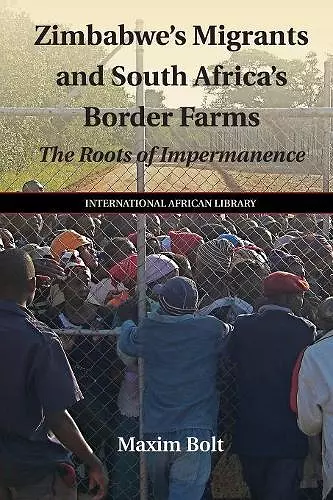Zimbabwe's Migrants and South Africa's Border Farms
The Roots of Impermanence
Format:Paperback
Publisher:Cambridge University Press
Published:1st Jun '17
Currently unavailable, and unfortunately no date known when it will be back
This paperback is available in another edition too:
- Hardback£90.00(9781107111226)

This book addresses the complex labour and life conditions faced by workers in the agricultural borderlands of northern South Africa.
Maxim Bolt explores the lives of Zimbabwean migrant labourers, of settled black farm workers and their dependants, and of white farmers and managers, as they intersect on the Zimbabwean-South African border. Focusing on one farm, the book investigates the role of a hub of wage labour in a place of crisis.During the Zimbabwean crisis, millions crossed through the apartheid-era border fence, searching for ways to make ends meet. Maxim Bolt explores the lives of Zimbabwean migrant labourers, of settled black farm workers and their dependants, and of white farmers and managers, as they intersect on the border between Zimbabwe and South Africa. Focusing on one farm, this book investigates the role of a hub of wage labour in a place of crisis. A close ethnographic study, it addresses the complex, shifting labour and life conditions in northern South Africa's agricultural borderlands. Underlying these challenges are the Zimbabwean political and economic crisis of the 2000s and the intensified pressures on commercial agriculture in South Africa following market liberalization and post-apartheid land reform. But, amidst uncertainty, farmers and farm workers strive for stability. The farms on South Africa's margins are centers of gravity, islands of residential labour in a sea of informal arrangements.
'This closely attentive ethnography of a particular border farm in the new South Africa adds remarkable experiential and cultural depth to the understanding of migrant farm workers, as they manage and conceptualize work, time, money and relationships in their intimate lives, on and off the farm.' Jane I. Guyer, The Johns Hopkins University
'In precise, limpid prose, Maxim Bolt brings to life the human ecology of a border farm. Ever alert to the counter-intuitive, he shows how stability is fashioned in the midst of the unstable, and how work organises life in a time of mass unemployment. The monograph sheds light on new and important social processes. It is a significant achievement.' Jonny Steinberg, author of A Man of Good Hope
'An extremely well-written ethnography which engages with relevant theoretical analyses of migration, borders, capitalism, labour and work. Bolt demonstrates great scholarship and speaks to a range of academic fields: anthropology, sociology, political economy, migration and development studies. It will be of great interest to scholars of southern Africa.' Blair Rutherford, Carleton University, Ottawa
'A thoughtfully structured and beautifully written manuscript which does justice to a very complex set of dynamics in Zimbabwe and across the borders. It deserves to be widely read and appreciated. Graduate students from a range of disciplines would be particularly able to relate to this material. The book is at a unique intersection of a number of scholarly fields, namely labour studies, agrarian studies, border studies, displacement and migration studies besides the broader discipline of economic anthropology.' Amanda Hammar, University of Copenhagen
'Separated into eight chapters and based upon both archival work and interviews with various farm personnel, ranging from fruit pickers, to foremen, office staff, and the farm owners and their families, Bolt has been able to demonstrate the sheer degree of complexity and interaction that exists in such settings. … It is the examination of this populace and the various interactions they have within Grootplaas that is one of the greatest strengths of Bolt's monograph. Through living on the farm himself, and serving as part of a fruit picking team during the annual harvest, the author has gained unprecedented access to communities that have previously been closed to academics. … this is a very strong monograph.' Richard Daglish, Reviews in History
'Maxim Bolt's beautifully written ethnography takes us on a journey into the lives of white commercial farmers and their employees in the remote Limpopo Valley. … Bolt's work contributes a nuanced analysis of the intersection between personhood and workforce membership in a context of political and economic precarity. Leila Sinclair-Bright, African Studies Review
'… an interesting and inspiring book that offers a range of insights for scholars concerned with border economies, labour migration, masculinity, the anthropology of agriculture and South African studies.' Sylvia Meichsner, Journal of Borderlands Studies
ISBN: 9781107527836
Dimensions: 230mm x 153mm x 16mm
Weight: 410g
268 pages